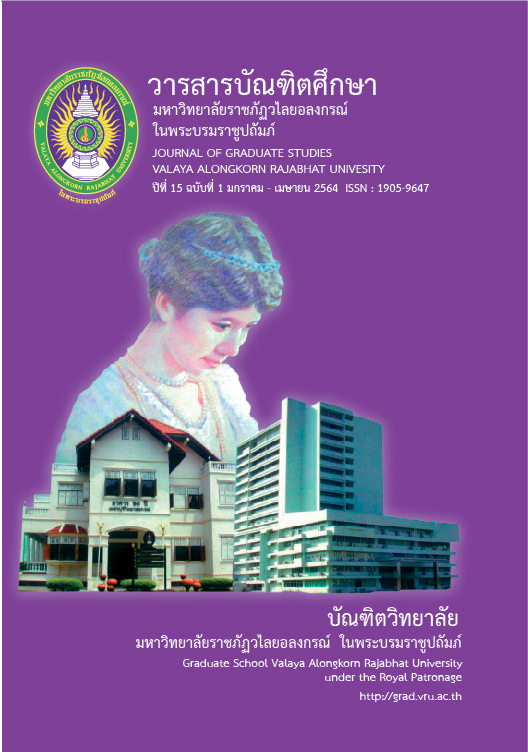AN APPROACH TO SUSTAINABLE TOURISM DESTINATION OF KOH CHANG, TRAT PROVINCE
Main Article Content
Abstract
The objectives of this research were to 1) study the tourism potential factors: physical, economy, social, environment and law, 2) evaluate the elements of sustainable tourism in tourism resource, tourism service and tourism marketing, and 3) propose an approach to sustainable tourism destination of Koh Chang. The research was a qualitative research using the in depth interviews with 42 stakeholders and applied the content analysis.
The research data found that: 1) there are active tourism potential factors in physical, economy and social. However, there are many problems such as the road is not link throughout the islands, there are no fishing activity and no tourism access during rainy season while facing fresh water shortage for agriculture and tourism during summer, high cost of living as well as there is the over carrying capacity during tourist high season. Moreover, there are poor potential in environment and law factors. 2) The data also indicated the tourism resources, tourism services and tourism market in Koh Chang. 3) An approach to sustainable tourism destination of Koh Chang (1) GREEN tourism strategy. (2) Market Segmentation strategy. (3) Differentiation strategy. And (4) Multi- language online marketing strategy.
Article Details

This work is licensed under a Creative Commons Attribution-NonCommercial-NoDerivatives 4.0 International License.
บทความทุกเรื่องได้รับการตรวจความถูกต้องทางวิชาการโดยผู้ทรงคุณวุฒิ ทรรศนะและข้อคิดเห็นในบทความ Journal of Global of Perspectives in Humanities and Social Sciences (J-GPHSS) มิใช่เป็นทรรศนะและความคิดของผู้จัดทำจึงมิใช่ความรับผิดชอบของบัณฑิตวิทยาลัย มหาวิทยาลัยราชภัฏวไลยอลงกรณ์ ในพระบรมราชูปถัมภ์ กองบรรณาธิการไม่สงวนสิทธิ์การคัดลอก แต่ให้อ้างอิงแหล่งที่มา
References
Department of Tourism Ministry of Tourism and Sports. (2016). krommakān thō̜ngthīeo krasūang thō̜ngthīeo læ kīlā [Department of Tourism Ministry of Tourism and Sports]. Retrieved from http://www.tourism.go.th.
Department of Tourism Ministry of Tourism and Sports. (2019). kromkān thō̜ngthīeo krasūang thō̜ngthīeo læ kīlā [Department of Tourism Ministry of Tourism and Sports] Retrieved from http://www.tourism.go.th.
Department of Tourism Ministry of Tourism and Sports. (2020). krommakān thō̜ngthīeo krasūang thō̜ngthīeo læ kīlā Retrieved from http://www.tourism.go.th.
Graci, S. and Dodds, R. (2010). Sustainable Tourism in Island Destination. London: Earthscan Publications
Graci, S. and Dodds, R. (2011). Unsustainable Development in Koh Phi Phi, Thailand. Washington: Earthscan Publications.
Kakazu, H. (2012). Sustainable Island Tourism: the Case of Okinawa .Clevendon: Channel View Publication.
Kita, B. (2007). kānčhatkān kānthō̜ngthīeo yāng yangyư̄n nai prathēt Thai: nǣo patibat thī dī samrap SME [Sustainable Tourism Management in Thailand: A Good Practices Guide for SME.] Bangkok: Chulalongkorn University.
Kokkranikal, J. and Baum, T. (2011). Tourism and Sustainability in the Lakshadweep Islands. London: Mansell.
Ministry of Tourism and Sport. (2012). phǣn phatthanākān thō̜ngthīeo hǣng chāt chabap thī nưng Phō̜.Sō̜. sō̜ngphanhārō̜ihāsiphā - sō̜ngphanhārō̜ihāsipkāo [The First National Tourism Development Plan 2012-2016]. Retrieved from http://www.mots.go.th/ewt_dl_link.php?nid+7114
Moyle B.and Others. (2011). Sustainable Host- Guest Interactions on Islands: Bruny and Magnetic Islands. Harlow: Longman.
Organization for Economic Co-operation and Development. (2011). Green Growth and Sustainable Development. Retrieved from https://www.oecd.org>greengrowth.
Richards, G. (2009). Creative Tourism and Local Development.U.S., Santa Fe: Sunstone Press.
Trat Provincial Office. (2018). phǣn phatthanā čhangwat trāt sō̜ngphanhārō̜ihāsipčhet – sō̜ngphanhārō̜ihoksipʻet Trat [Development Plan 2014-2018.] Retrieved from http://www.trat.go.th.


